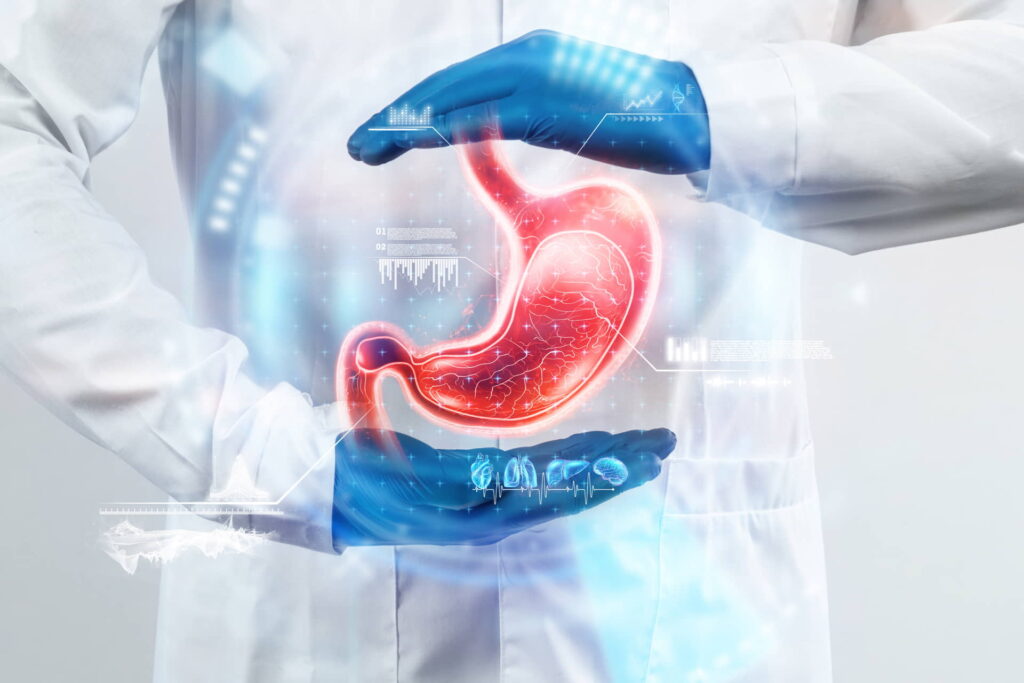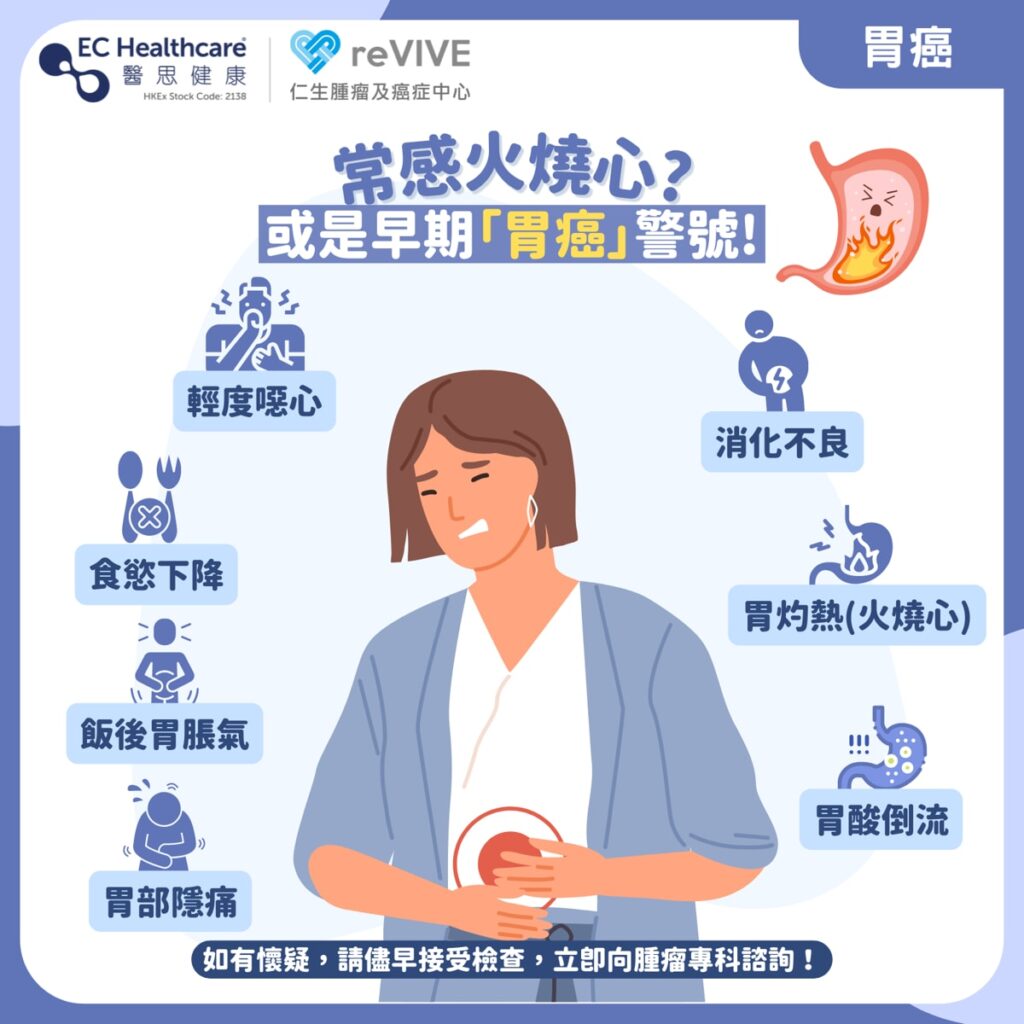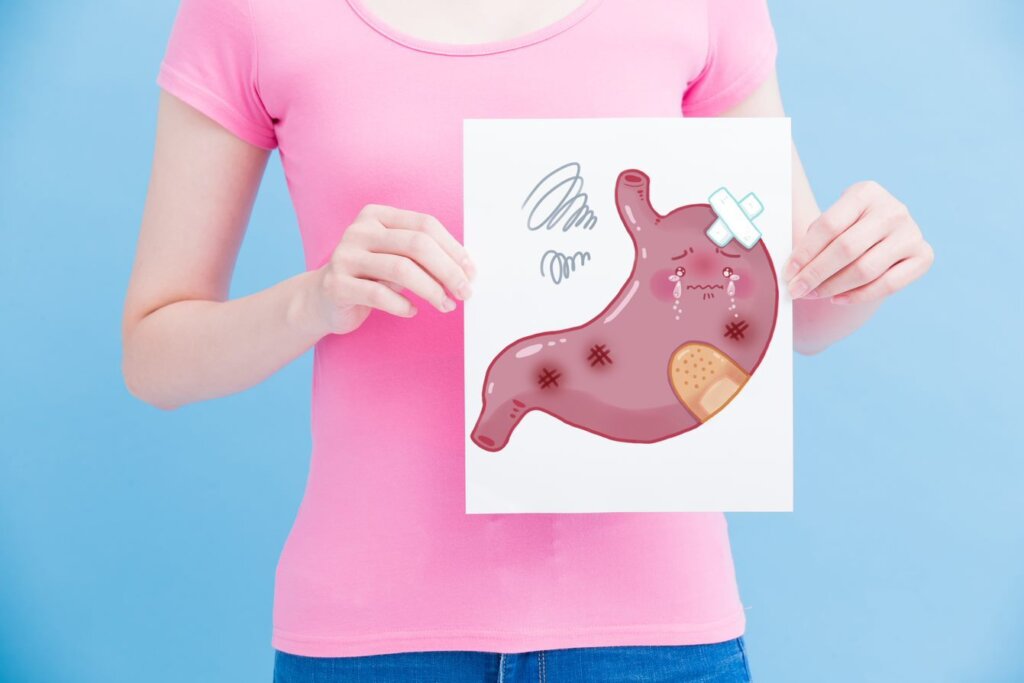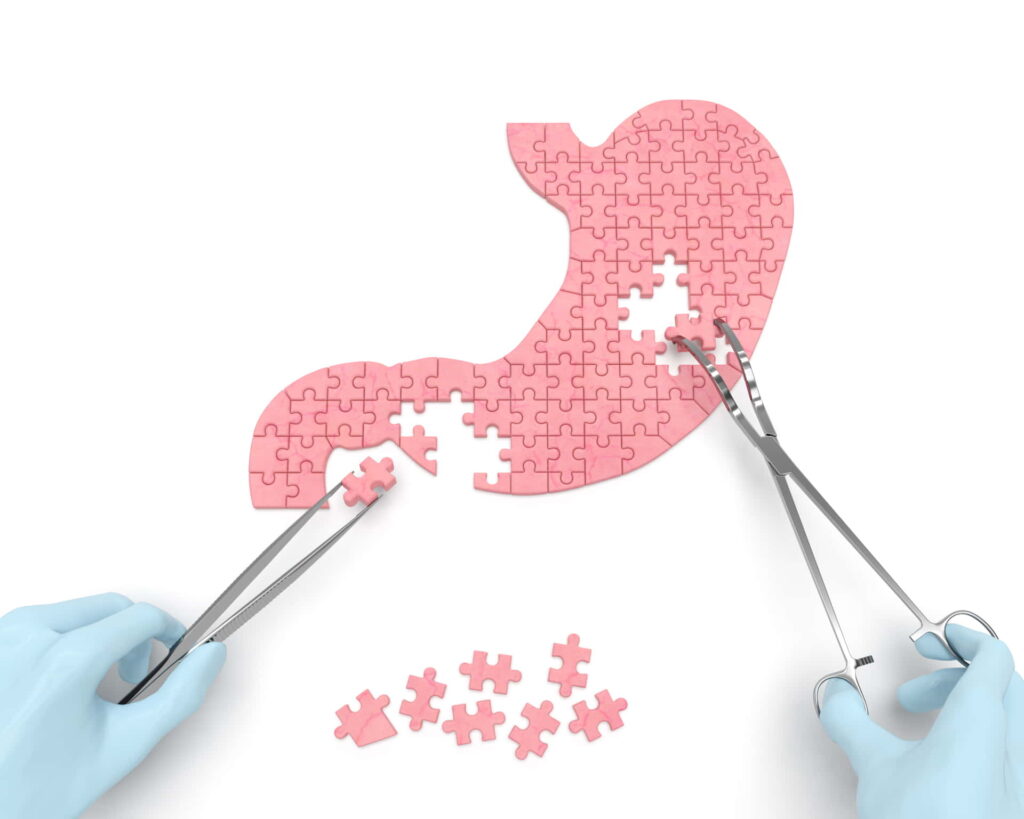
Stomach Cancer
Understanding the causes and symptoms of stomach cancer for effective treatment and prevention to improve the survival rate
Stomach cancer is the sixth deadliest cancer in Hong Kong. The causes of stomach cancer are related to Helicobacter pylori (H. pylori) infection, obesity, smoking, and long-term high sodium consumption. The common symptoms of the disease include indigestion, upper abdominal pain, loss of appetite and unintentional weight loss. The global average 5-year survival rate for stage IV stomach cancer is only about 4%, while that for stage I is over 50%. If the cancer is diagnosed and treated early, the rehabilitation process will be easier. Prevention for stomach cancer should start with improving eating habits.
Eating habits are the main focus in the prevention of stomach cancer. Consume more fresh fruits and vegetables and fewer marinated foods. Be alert if symptoms such as indigestion and loss of appetite persist. Remember to receive an annual check-up, especially when close relatives have suffered from stomach cancer.
What is stomach cancer?
The stomach is part of the digestive system. Stomach cancer occurs when stomach cells develop into a malignant tumor via genetic mutation. According to the statistics provided by the Hospital Authority, more than 1,000 new cases are diagnosed each year. Therefore, stomach cancer is not rare and can be fatal. We should not underestimate it.
Survival Rate of Stomach Cancer
Stomach cancer accounted for 4.7% of all cancer deaths in 2019. The age-standardized mortality rate per 100,000 population was 5.4 for men and 3.5 for women respectively. It is important to note that the incidence rate of stomach cancer increases with age, and the median age of patients is approximately 71 years old. The survival rate of stomach cancer is relatively low. The global 5-year survival rate is only 4% on average for stage IV stomach cancer, and over 50% for stage I.
Symptoms of Stomach Cancer
Early-stage stomach cancer symptoms are similar to common stomach discomfort, leading patients to overlook the severity of their condition and delay seeking medical attention. The common symptoms include indigestion, upper abdominal pain, loss of appetite and weight loss. Half of the patients who notice the presence of cancer and receive treatment usually have their tumor spread to other tissues and reached the advanced stage. When experiencing persistent stomach discomfort, it may be a warning sign of stomach cancer. It is recommended to undergo early screening to detect the condition.
Early Symptoms
The 5-year survival rate for early-stage stomach cancer is up to 90%. Therefore, you should seek immediate medical advice if you identify the following early symptoms of stomach cancer.
- Persistent indigestion
- Loss of appetite and rapid weight loss
- Bloating after a meal
- Vomiting, or even hematemesis (vomiting blood)
- Blood in the stools or black stools
- Fatigue
- Swelling of the lower abdomen

Advanced Symptoms
Cancer cells in the advanced stage of stomach cancer may obstruct the stomach or large intestine and even spread to the liver and large intestine. The symptoms in this stage include loss of appetite, jaundice (yellowing of the skin and the whites of the eyes), and ascites (accumulation of excessive fluid in the abdominal cavity).
Be alert if symptoms appear suddenly and persist for about 1 month since more symptoms indicate the larger size of the tumour. In contrast, there is no need to worry if the symptoms only appear for a week and then subside. Stomach cancer can be treated with surgery, chemotherapy or radiotherapy, and most side effects can be alleviated with medications. Notify the doctor immediately if there are severe side effects.

Risk Factors of Stomach Cancer
Stomach cancer occurs when there are genetic mutations in the DNA of stomach cells, leading to rapid growth and the formation of tumors instead of cell death. Cancer cells can outnumber healthy cells and potentially spread to other parts of the body. While the medical community has not yet reached a definitive conclusion on the causes of stomach cancer, it is believed to be associated with Helicobacter pylori (H. pylori) infection. In 1994, the World Health Organization classified H. pylori as a Group 1 carcinogen (i.e. a definite cause of cancer). H. pylori is the only bacterium that can survive in the acidic environment of the stomach and is found in the stomach and duodenum. H. pylori can induce stomach acid secretion, damage the stomach lining, and lead to peptic ulcers.
Other risk factors
- H. pylori infection
- Men are twice as likely as women to develop stomach cancer
- The chance of developing stomach cancer is higher after the age of 50
- Obesity
- Long-term consumption of high-sodium, marinated and smoked food
- Inadequate consumption of fruits and vegetables
- Smoking
- People who have family members with stomach cancer are more than twice as likely to develop stomach cancer than normal people.
- People with stomach polyps or pernicious anaemia, or undergone gastrectomy
- Long-term exposure to specific hazardous environments (e.g. working in coal, metal, or rubber industries)

Endoscopy and radiology are used to diagnose stomach cancer.
Oesophago-gastro-duodenoscopy (OGD, also known as gastroscopy)
OGD can visualize the lesions unable to be noticed with naked eyes in the body, thus providing a reference for the doctor's diagnosis and treatment. The doctor will insert a flexible and soft endoscope through the mouth to carry out an upper gastrointestinal examination by inspecting the oesophagus, stomach, and duodenum. The doctor can observe the conditions or lesions of the stomach on the screen, such as abnormal cells, ulcers or polyps. This procedure not only can directly observe lesions, but also extract tissues for pathological examination. Many diseases can also be treated using endoscopy to avoid the incisions and risks associated with traditional open surgery.
Therefore, gastroscopy has unparalleled advantages over other methods in observing gastrointestinal lesions above the descending duodenum.
Ultrasound and computed tomography (CT) scan of the abdomen
There are countless possible causes of abdominal pain. The doctor will use an upper abdominal ultrasound to examine the liver, gallbladder, pancreas, spleen, and kidney for possible lesions. For example, the doctor will measure the size of each organ and identify the presence of hypertrophy, tumors or other abnormalities. It can also be used to diagnose diseases such as hepatitis, cirrhosis, gallstones, pancreatitis, stomach cancer, etc. Patients must fast for 6 hours before the test.
Screening and Diagnosis of Stomach Cancer

Treatment of Stomach Cancer
If a patient is diagnosed with stomach cancer, the doctor will recommend the following treatments:
1. Gastrectomy
Gastrectomy is the primary treatment for stomach cancer. This treatment is feasible if the cancer cells have not spread in the stomach, but may require the removal of all or part of the stomach. In general, the cure rate of patients after receiving gastrectomy can reach 90% if the lesion is limited to the mucosa and submucosa of the stomach. Sometimes the surgery alone can treat the cancer, while sometimes the combination with other treatments such as chemotherapy or radiotherapy is required.
*Patients need to adjust their diet after removing their stomachs. For example, they should eat small, frequent meals, consume easy-to-digest foods, maintain a habit of chewing food slowly and taking a break after meals to avoid indigestion.
2. Radiotherapy
*Radiotherapy destroys cancer cells by high-energy radiation which can damage the chromosomes (DNA) in the cancer cells and kill them, but may affect normal cells in the process. However, in the past few decades, the treatment planning and precision of radiotherapy have improved significantly to largely reduce the damage and side effects to the surrounding benign cells. Doctors may, under suitable conditions, adopt radiotherapy to reduce the size of larger tumors before conducting surgery. This can help ensure the complete removal of the tumor. Radiotherapy can also be adopted after the surgery to eradicate the remaining cancer cells around the tumor, which prevent recurrence and improve survival rates after surgery.
3. Chemotherapy
Chemotherapy, also known as cancer pharmacotherapy, involves the use of single or multiple kinds of anti-cancer drugs administered orally or intravenously. The drugs will destroy or inhibit the division and proliferation of cancer cells in various parts of the body through the blood bloodstream. In addition, chemotherapy can alleviate symptoms and be used as an adjunctive therapy. It can relieve the pain of patients with hard-to-treat cancer, and reduce the risk of cancer recurrence if performed in conjunction with surgery and radiotherapy. Platinum-based drugs, paclitaxel, and 5FU-based drugs are commonly used to treat stomach cancers.
4. Targeted therapy
Some stomach cancer patients have a cell surface receptor called HER2. The overexpression of this receptor will promote the proliferation of cancer cells. If HER2 inhibitors are used together with chemotherapy drugs, the tumour size can be reduced significantly. There are multiple generations of targeted HER2 drugs, in particular, the antibody-drug conjugate (ADC) launched recently can identify HER2 receptors on cancer cells. When the drug is precisely attached to the cancer cells, it can completely enter their nuclei and release a high dosage to kill them while minimising the damage to healthy cells.
5. Immunotherapy
Immunotherapy has significantly changed the direction of treatment for advanced cancer in recent years. In the past, stomach cancer patients without HER2 expression could not adopt targeted therapy and could only choose chemotherapy. However, it has been found in recent years that the combination of immunotherapy and chemotherapy can significantly improve the overall survival rate of patients, especially those who score five or above (combined positive score, CPS) in the PD-L1 test. Immunotherapy brings new treatment options and new hope to patients with advanced stomach cancer.

Prevention of Stomach Cancer
To prevent stomach cancer, it's crucial to adopt healthy lifestyle habits early on, like following anti-cancer dietary principles to strengthen the body's immune system and reduce the risk of developing the disease. To avoid H. pylori infection, practice good personal hygiene. If experiencing ongoing stomach discomfort, promptly seek medical exams. People over 40 should have yearly gastroscopy screenings.
- Common dietary recommendations for cancer prevention can be adopted, including:
- Cruciferous vegetables (e.g. broccoli, cabbage, kale etc.) contain cancer-fighting properties that help to break down carcinogens in the body.
- Fruits and vegetables rich in carotene (e.g. carrots, mangoes, papayas, etc.) help to strengthen the immune system and directly reduce the chance of developing cancer.
- Foods rich in vitamin C (e.g. oranges, grapefruits, strawberries, etc.) have antioxidant properties that can reduce the chance of developing stomach cancer.
- Avoid eating marinated, smoked, and grilled foods (e.g. sausages, salted egg, ham, preserved meat, salted fish, etc.) as carcinogenic compounds are released during the production process.
- Avoid fried food. The free radicals released during the frying process will reduce the oxygen content of body tissues and damage them.
- Pay attention to personal hygiene:
- Wash your hands more often and avoid direct contact with faeces or vomit to prevent H. pylori infection.
- Arrange regular check-ups
- Regular annual gastroscopy is recommended for people over 40 years old if their close family member has been diagnosed with stomach cancer.
Stomach Cancer FAQ
Q. Is stomach cancer usually diagnosed in the advanced stage?
According to the data from the World Cancer Research Fund, stomach cancer is the 4th most common type of cancer in the world. According to the survey statistics, East Asian countries such as China, Japan and Korea have the highest number of diagnosed stomach cancer cases in the world, but Asian people have a higher survival rate for stomach cancer. Currently, the number of accumulated cases of stomach cancer is one million, accounting for 8% of all cancers, and is predicted to increase to 1.7 million by 2030.
The early symptoms of stomach cancer are similar to those of stomach diseases, such as bloating and dull pain in the upper abdomen, acid reflux, loss of appetite, anaemia, weakness, and other mild symptoms. When obvious symptoms such as sudden weight loss, black stools, anorexia, difficulty in swallowing, severe anaemia, and fatigue appear, it means that the disease has reached the intermediate or advanced stage and the patient has missed the chance for early detection.
Q. What are the complications of stomach cancer?
Complications of stomach cancer include gastrointestinal bleeding, peritoneal metastasis, pyloric obstruction, diffuse peritonitis caused by tumor perforation, etc. Certain complications often emerge along with the disease development. Patients are reminded to take proper treatment to avoid more serious consequences.
Q. Can a person live without a stomach?
It may be surprising to learn that a person can live without a stomach. However, the body is able to bypass the stomach's primary function of storing and breaking down food and gradually deliver the food to the intestines. Small amounts of food can enter the small intestine directly from the oesophagus without the stomach.
Q: Does stomach ulcer lead to stomach cancer?
Stomach ulcers themselves do not cause stomach cancer, but stomach cancer can present itself in the form of stomach ulcers. Additionally, long-term H. pylori infection can cause intestinal metaplasia of the normal gastric mucosa, which can progress to stomach cancer even without the appearance of stomach ulcers.
Q: What is the difference between the symptoms of stomach ulcers and stomach cancer?
Although the symptoms and pain sensations of stomach ulcers and stomach cancer are similar, we can try to differentiate them based on the timing of the pain. As the tumor is solid, stomach cancer patients typically experience pain after eating due to friction between the food and the tumor. However, if the pain occurs on an empty stomach and is relieved after eating, it is more likely to be caused by stomach acid and indicative of stomach ulcer pain.



